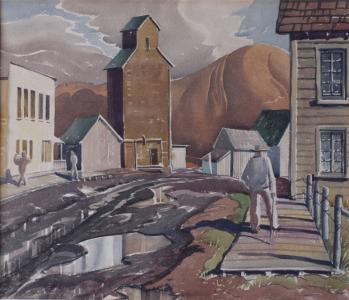Henry George (H.G.) Glyde - Bow Falls, Banff
- Bow Falls, Banff
- Oil on Canvas
- 18 x 22 in
- circa 1945
- Sold
- Private Collection
Signed " H. G. Glyde, RCA" on verso
circa 1945
Henry George Glyde was born in Luton, Bedfordshire, England in 1906. He trained at the Brassey Institute in Hastings (where he first met his long-time associate A.C. Leighton) and later, graduated from the Royal College of Art in London in 1930.
A.C. Leighton, who had immigrated to Canada some years before, hired Glyde to join the faculty at the Provincial Institute of Technology (now Alberta University of the Arts). So, in 1935, Glyde and his family moved to Canada, and he took up the post as a drawing instructor at The Tech. In 1936 when Leighton's poor health forced him into partial retirement, Glyde became head of the Art Department. He also joined Leighton during the summers at Banff where he eventually took the lead in 1938; he remained head of the painting department there until 1967.
From 1936 to 1945, Glyde pioneered the first community art courses in the rural centres of Vegreville, Lethbridge and Grande Prairie along with Walter J. Phillips. The two artists shared the teaching of all classes while continuing to paint and exhibit their own work. In 1943, he and A.Y. Jackson were selected by the National Gallery to document the construction of the Alaska Highway. Two years later, Glyde took over from Leighton as president of the Alberta Society of Artists and in 1946, moved to Edmonton to establish an art program at the University of Alberta. He served as the Head of the Art Department there for twenty years.
Glyde was elected to the Royal Canadian Academy in 1949 and traveled to Europe in 1958 upon being awarded a senior fellowship from the Canada Council for the Arts. Retiring in 1966, he moved to Pender Island, B.C. with his wife. He continued to paint until his death in Victoria at the age of 91.
Glyde’s work can be found in the permanent collections of the National Gallery of Canada, the Toronto Art Gallery, the Glenbow Museum and other public and private collections.
Henry George Glyde was significant to the development of art in Alberta. Over his long career, experimentations with texture and abstraction lead Glyde to create a distinctive reflection of Western Canada based on direct observation and interaction with its landscape and people.
More Artwork from this Artist
Nude (Verso Mountain Study - Saskatchewan River Crossing)
- Oil on Panel
- 13 x 16 in
- circa 1951
- CAD $10000.00
Canmore, Alberta
- Oil on Canvas Board
- 16 x 20 in
- 1970
- CAD $14000.00
Rosebud, Alberta
- Watercolour on Paper
- 13.5 x 15.5 in
- Price available on request



